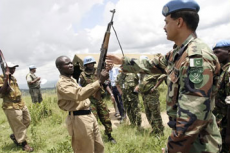
Email: ZYVC057@live.rhul.ac.uk
Total Article : 213
About Me:I'm a graduate student studying International Criminal Law and first started writing for King's News almost 4 years ago! My hobbies include reading, travelling and charity work. I cover many categories but my favourite articles to write are about mysteries of the ancient world, interesting places to visit, the Italian language and animals!

Disarmament, Demobilisation and Rehabilitation programs (DDR) help reintegrate child soldiers psychically, socially and psychologically back into society. Generally these projects include four main steppingstones. First officials seeks to locate the family of the child soldier and reunite them; secondly the children are offered psychological support and guidance in order to understand what they have been complicit of in conflict. Next the children are taught specific skills which will facilitate job hunting in their village, for example tie dying for girls, and they are guided by a mentor. Lastly, the children are offered the education which they were deprived of during their time as soldiers.
Michael Wessells , who spent time in a rehabilitation centre in Sierra Leone, noted that many children simply did not know how to survive without their gun, which had been their source of protection for years. The children also did not recognise the difference between peace and war as even after the conflict had ended famine was still widespread. In response to this, UNICEF organised the reintegration of child soldiers in society, however as child soldiers returned home they were feared as rebels and girls who had been raped were considered a shame to society.
These challenges were dealt with by the Christian Children’s Fund (CCF) in particular which worked both with children and village members in order to improve societal relationships and reconcile those who had been divided by war in order to create a peaceful environment for all. They held open meetings for citizens concerned with the outcome of war and how to move forward, allowing the community to work together and come up with a project for their village, such as the establishment of a school, whilst also helping them realise their objective together through dialogue and cooperation. The result is that over 90% of the former child soldiers are now living once again in their village and have stated that they feel like citizens and are hopeful for a more positive future; the project has also reduced fighting between individuals in the area.
Article 39 of the UN Convention on the Rights of the Child urges nations worldwide to adopt this approach as ‘children who have experienced neglect, abuse, exploitation, torture or who are victims of war must receive special support to help them recover their health, dignity, self-respect and social life’ . Whilst reintegration is not an easy route to take, it has given former child soldiers a more positive reality, which is a ‘remarkable contrast to what seemed possible during the war’.
Ishmael Beah wrote a first-hand account of his own experience as a child soldier and the rehabilitation process he was given in his biography A Long Way Gone. After being separated from his immediate family and wandering from village to village for a year, Ishmael became a child soldier at the age of thirteen. He fought for the government army which provided a shelter and food, - commodities which Ishmael had not seen for quite some time - against the rebels who had killed his family. After almost three years Ishmael was rescued by UNICEF.
Forced to live without his gun, drugs and alcohol, which had been his source of survival throughout the conflict, Ismael did not adapt easily to his new life. After six months in a rehabilitation centre for child soldiers Ishmael was reunited with his uncle and he began to adapt a peaceful life. When conflict arose again, Ishmael was sent to New York where he attended the UN International School and then pursued the study of Political Science at Oberlin College. Ishmael was given the attention he needed to both come to terms with his wrongdoings and be accepted by society once again. As he stated in a conference at the UN in which he represented child soldiers in Sierra Leone ‘It was not easy being a child soldier but we just had to do it. I have been rehabilitated now so don’t be afraid of me. I am not a soldier anymore; I am a child’, and that is precisely how all former child soldiers deserve to be treated.
Image: http://www.un.org/africarenewal/sites/www.un.org.africarenewal/files/combatants2.jpg

0 Comment:
Be the first one to comment on this article.